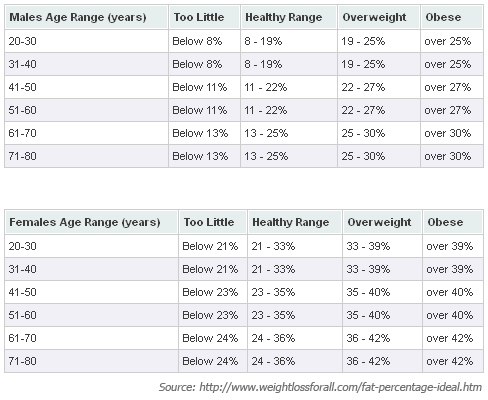
Understanding body fat percentage
The human body is made up of fat, lean tissue, bones, and water. Your body fat percentage is the proportion of fat that your body has. If you are 140 pounds and have 10 percent fat, this means that your body is composed of 14 pounds fat and 126 pounds of bone, muscle, organ tissue, blood and the other things.
There are two types of body fat: essential fat and storage fat. Essential fat is fat that your body needs to perform its normal functions. Storage fat is that which builds up beneath your skin, in certain specific areas inside your body, and in your muscles.
When storage fat increases, you gain weight. Too much or too little storage fat is unhealthy.
Age and body fat percentage
Age is a major factor for changes in body fat percentage. Here are noteworthy points:
- During adolescence, boys tend to add more lean mass and less body fat. Girls put on more body fat than boys during adolescence and this is normal and healthy.
- In adulthood, the range of body fat percentage differs for both men and women.
- After the age of 30, the body tends to lose lean tissue. The muscles, liver, kidney, and other organs may also lose some of their cells. The bones may lose some of their minerals and become less dense (osteoporosis). Tissue loss reduces the amount of water in your body. As a result, the amount of body fat increases steadily after 30 and may rise by as much as 30%.
- During pregnancy, a woman gains fat due to the changes that take place in her body.
- While men often gain weight until about age 55, women gain weight until 65.
The following table shows the recommended body fat levels of men and women in different age groups:

Health risks of high body fat percentage
High body fat percentage can lead to obesity and has health risks. Experts say that it is important to note that you can have a normal weight and still be considered obese if your body fat percentage is high. Obesity increases your risk of serious health problems, such as heart disease, diabetes, high blood pressure, bad cholesterol, metabolic syndrome, osteoarthritis, and certain cancers.
A healthy lifestyle can help maintain your weight and reduce the impact of age-related changes, including changes in fat percentage levels. This means exercising and being physically active, eating nutritious food, getting sufficient sleep, managing stress, and limiting the use of alcohol. If you find that your body fat percentage is a matter of concern, consult your doctor.